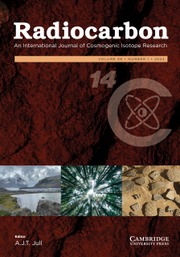No CrossRef data available.
Article contents
Oontong-Java Plateau
Published online by Cambridge University Press: 18 July 2016
Extract
Core share and HTML view are not available for this content. However, as you have access to this content, a full PDF is available via the ‘Save PDF’ action button.
These cores were chosen for our initial effort because they typified normal open ocean conditions (see Fig 9; Tables 10, 11).
- Type
- Accelerator Mass Spectrometry Radiocarbon Measurements on Marine Carbonate Samples from Deep Sea Cores and Sediment Traps
- Information
- Copyright
- Copyright © The American Journal of Science
References
Andrée, M, Beer, J, Oeschger, H, Broecker, W S, Mix, A, Ragano, N, O'Hara, P, Bonani, G, Hofmann, H J, Morenzoni, E, Nessi, M, Suter, M and Wolfli, W, 1984, 14C measurements on foraminifera of deep sea core V28–238 and their preliminary interpretation: Nuclear Instruments & Methods, v B5, p 340–345.Google Scholar
Andrée, M, Beer, J, Oeschger, H, Mix, A, Broecker, W S, Ragano, N, O'Hara, P, Bonani, G, Hofmann, H J, Nessi, M, Suter, M and Wolfli, W, 1985, Accelerator radiocarbon ages on foraminifera separated from deep-sea sediments. Reprinted from, The carbon cycle and atmospheric CO2: Natural variations Achean to present: Geophys Mono 32, Am Geophys Union.Google Scholar
Peng, T-H and Broecker, W S, 1984, The impacts of bioturbation on the age difference between benthic and planktonic foraminifera in deep sea sediments: Nuclear Instruments & Methods, v B5, p 346–352.Google Scholar
Shackleton, N J and Opdyke, N D, 1973, Oxygen isotope and paleomagnetic stratigraphy of equatorial Pacific core V28–238, oxygen isotope temperatures and ice volumes on a 105 year time scale. Quaternary Research, v 3, p 39–45.Google Scholar


